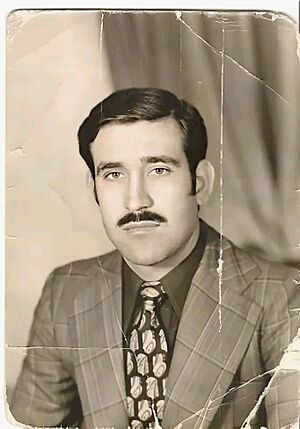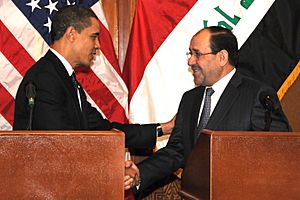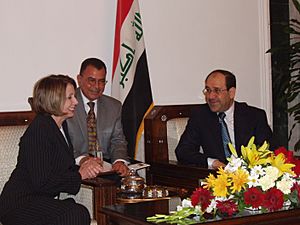Nouri al-Maliki facts for kids
Quick facts for kids
Nouri al-Maliki
|
|
|---|---|
|
نوري المالكي
|
|
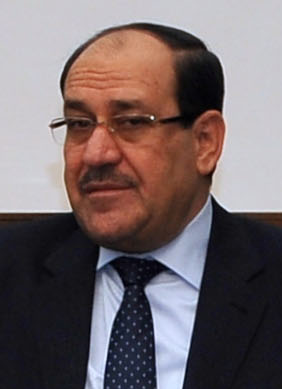
Al-Maliki in 2014
|
|
| Prime Minister of Iraq | |
| In office 20 May 2006 – 8 September 2014 |
|
| President | Jalal Talabani Fuad Masum |
| Deputy |
See list
|
| Preceded by | Ibrahim al-Jaafari |
| Succeeded by | Haider al-Abadi |
| Vice President of Iraq | |
| In office 10 October 2016 – 2 October 2018 Serving with Osama al-Nujaifi and Ayad Allawi
|
|
| Preceded by | Himself |
| In office 9 September 2014 – 11 August 2015 Serving with Osama al-Nujaifi and Ayad Allawi
|
|
| President | Fuad Masum |
| Preceded by | Khodair al-Khozaei |
| Succeeded by | Himself |
| Minister of the Interior | |
| In office 21 December 2010 – 8 September 2014 |
|
| Prime Minister | Himself |
| Preceded by | Jawad al-Bulani |
| Succeeded by | Mohammed Al-Ghabban |
| In office 20 May 2006 – 8 June 2006 |
|
| Prime Minister | Himself |
| Preceded by | Baqir Jabr al-Zubeidi |
| Succeeded by | Jawad al-Bulani |
| Minister of Defence | |
| In office 21 December 2010 – 17 August 2011 |
|
| Prime Minister | Himself |
| Preceded by | Qadir Obeidi |
| Succeeded by | Saadoun al-Dulaimi |
| Minister of National Security Affairs | |
| In office 21 December 2010 – 8 September 2014 |
|
| Prime Minister | Himself |
| Preceded by | Shirwan al-Waili |
| Leader of the Islamic Dawa Party | |
| Assumed office 1 May 2007 |
|
| Preceded by | Ibrahim al-Jaafari |
| Personal details | |
| Born |
Nouri Kamil Mohammed Hasan al-Maliki
20 June 1950 Al-Hindiya, Kingdom of Iraq |
| Political party | Islamic Dawa |
| Other political affiliations |
State of Law Coalition |
| Spouse | Faleeha Khalil |
| Relations | Muhammad Hasan Abi al-Mahasin (grandfather) |
| Children | 5 |
| Alma mater | Usul al-Din College University of Salahaddin (MA) |
| Religion | Shia Islam |
| Signature |  |
Nouri Kamil Muhammad-Hasan al-Maliki (Arabic: نوري كامل محمد حسن المالكي), born on 20 June 1950, is an Iraqi politician. He is also known as Jawad al-Maliki (جواد المالكي). Since 2007, he has been the leader of the Islamic Dawa Party. He served as the Prime Minister of Iraq from 2006 to 2014. He was also Vice President from 2014 to 2015 and again from 2016 to 2018.
Al-Maliki started his political journey in the late 1970s. He was against the former Iraqi president Saddam Hussein. He became well-known after he had to leave Iraq for 24 years. During his time away, he became a senior leader in the Islamic Dawa Party. He worked with groups that opposed Saddam and built connections with officials from Iran and Syria. He sought their help to change Saddam's government.
After the American-led occupation of Iraq (2003–2011), al-Maliki worked closely with the Multi-National Force. He continued to cooperate with the United States after their troops left Iraq.
In 2006, three years after the 2003 invasion of Iraq, al-Maliki became Iraq's first full-term prime minister after Saddam. His first government was approved on 20 May 2006. His second government was approved on 21 December 2010. In 2014, after some difficult times with the Islamic State, he announced his resignation as prime minister on 14 August 2014.
During his eight years in power, from 2006 to 2014, there were concerns about how government money was managed. He was also criticized for favoring certain groups and for challenges in uniting different groups within Iraq. In September 2014, al-Maliki was chosen as one of Iraq's three vice presidents. He held this position despite efforts to remove the post.
Contents
Early Life and Education
Nouri al-Maliki was born in the village of Janaja. This village is in Abu Gharaq, a town between Karbala and Al Hillah in central Iraq. He belongs to the Al-Ali Tribe. This tribe is part of the Bani Malik tribe.
He went to school in Al Hindiyah (Hindiya). After finishing high school, he moved to Baghdad with his family. For a time, al-Maliki lived in Al Hillah. There, he worked in the education department. His grandfather, Muhammad Hasan Abi al-Mahasin, was a poet and a religious leader. He was involved in the Iraqi revolution against the British in 1920. He also served as Iraq's Minister of Education under King Faisal I.
Time Away from Iraq and Return
On 16 July 1979, al-Maliki left Iraq. This happened after it was found that he was a member of the Islamic Dawa Party, which was not allowed. According to his party's website, he left Iraq through Jordan in October. He soon moved to Syria, where he used the name "Jawad."
He then went to Iran in 1982 and lived in Tehran until 1990. After that, he returned to Damascus. He stayed there until U.S.-led forces entered Iraq and removed Saddam's government in 2003. While in Syria, he worked for the Dawa party. He built strong connections with Hezbollah and the Iranian government. He supported Iran's efforts against Saddam's government.
In Damascus, al-Maliki was the editor of the party newspaper Al-Mawqif. He also became the head of the party's Damascus branch. In 1990, he joined the Joint Action Committee. This committee was a group of different Iraqi opposition parties based in Damascus.
When Saddam's government fell in April 2003, al-Maliki returned to Iraq. He became a deputy leader of a commission that worked to remove former Baath Party officials from the government and military. In January 2005, he was elected to the National Assembly. He was also part of the committee that wrote the new constitution in October 2005.
Becoming Prime Minister
Choosing a Leader
In the December 2005 Iraqi parliamentary election, a group called the United Iraqi Alliance won the most seats. They first chose Ibrahim al-Jaafari to be Iraq's prime minister. However, in April 2006, al-Jaafari had to step down. This was due to criticism from Kurdish and Sunni Arab politicians.
On 22 April 2006, al-Maliki was chosen as a possible new prime minister. This happened after the U.S. was closely involved in the selection process. United States Ambassador to Iraq Zalmay Khalilzad said that al-Maliki was seen as "independent of Iran." However, al-Maliki was also the preferred choice of Qasem Soleimani, a commander from Iran. Soleimani helped make the agreement between different Iraqi leaders that led to al-Maliki becoming prime minister.
Forming the First Government
On 20 May 2006, al-Maliki presented his government to the Parliament. He did not yet have permanent ministers for Defense and Interior. He announced that he would temporarily manage the Interior Ministry himself. Salam al-Zobaie would temporarily act as Defense Minister. Al-Maliki told the assembly members, "We pray to God almighty to give us strength so we can meet the ambitious goals of our people who have suffered a lot."
First Term: 2006-2009
During his first term, al-Maliki promised to deal with groups that were causing trouble. He called them "organized armed groups who are acting outside the state and outside the law." He was criticized for taking too long to name permanent interior and defense ministers. He did so on 8 June 2006. This was around the same time that al-Maliki and the Americans announced the killing of Al Qaeda in Iraq leader Abu Musab al-Zarqawi.
Al-Maliki also spoke out against coalition forces. This was after reports of alleged killings of Iraqi civilians became known. He was quoted saying that such actions were "unacceptable." His relationship with the press was often difficult. In August 2006, he banned TV channels from showing images of violence in the country. He warned of legal action against those who did not follow the order.
His job was made harder by the balance of power in parliament. His position depended on the support of two groups, Muqtada al-Sadr's group and the Supreme Islamic Iraqi Council. His own Dawa party often disagreed with these groups. Progress was also often stopped by Sunni Arab politicians. They claimed that the main Shiite parties were seeking advantages for their own group.
On 30 December 2006, al-Maliki signed the order for Saddam Hussein's execution. He said there would be "no review or delay." He stated, "Our respect for human rights requires us to execute him." Hussein was executed on 30 December 2006.
In 2007, some U.S. military officers claimed al-Maliki was replacing Iraqi commanders who had fought against certain groups with people loyal to his party. A spokesman for al-Maliki denied this claim. In May 2007, the Islamic Dawa Party chose al-Maliki as its Secretary-General.
By late 2008, the security situation in many parts of Iraq had improved. In Baghdad, a peace agreement between Muqtada al-Sadr's Mahdi Army and the government had reduced tensions. In May 2009, Maliki spoke about the need to create a safe environment for investment. This was important for successful rebuilding. He also passed new investment laws to help with this.
Second Term: 2010-2014
On 22 December 2010, al-Maliki's second government was approved by parliament. This happened nine months after the 2010 parliamentary election. On 5 February 2011, a spokesperson for al-Maliki said he would not seek a third term in 2014. He said this was for the sake of democracy.
In December 2011, the Vice President of Iraq, Tariq al-Hashemi, faced serious accusations. This led to his party boycotting parliament. Hashemi was later sentenced to death in his absence. This situation increased anger among some Sunni Muslim and Kurdish groups. They felt Maliki was taking too much power.
Al-Maliki led Iraq through a period of increased challenges. This included dealing with protests in 2012–2013. The military under al-Maliki's leadership faced issues with corruption. When the Islamic State became more active in 2013–2017, Maliki led Iraq through major difficulties. This included the June 2014 northern Iraq offensive. During this time, the Iraqi army faced significant difficulties, and the city of Mosul fell.
A former commander of the Iraqi ground forces, Ali Ghaidan, said al-Maliki gave the order to withdraw from Mosul. By late June 2014, the Iraqi government had lost control of its borders with Jordan and Syria. Al-Maliki asked for a national state of emergency on 10 June after the attack on Mosul. However, Iraq's parliament did not allow him to declare it. Many legislators opposed giving the prime minister more powers.
By August 2014, al-Maliki was still trying to hold onto power. This was despite Iraq's president Fuad Masum nominating Haidar al-Abadi to take over. Al-Maliki took the matter to court, saying the president's nomination was against the constitution. However, on 14 August 2014, al-Maliki announced he was stepping down. This came after many world leaders and members of his own party called for him to resign.
Challenges with Different Groups
Some critics say that al-Maliki tried to limit the power of both Kurds and Sunnis between 2006 and 2014. They believe he worked to centralize power for his party. Instead of making Iraq stronger, his actions led to more challenges among different groups. This resulted in difficulties for the Iraqi state.
Al-Maliki's time in power has been described as favoring certain groups. This contributed to challenges in the country in 2014. During the Northern Iraq offensive in June 2014, the ISIS group aimed to take power from al-Maliki. He asked Kurdish Peshmerga forces for help. He also sought air support from American drones to deal with dangerous groups. However, the United States did not agree to use warplanes or armed drones.
Al-Maliki's resignation on 14 August 2014 and the change to Haider al-Abadi's leadership brought a shift in public opinion among Sunni Arabs. Many were hopeful that the new government would address their concerns. They hoped it would provide more public services than al-Maliki's government.
Relationship with the United States
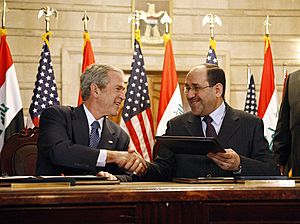
In an interview in June 2008, al-Maliki said that a plan for U.S. troops to leave Iraq in "about 16 months" would be a good timeframe. He said this would not be a sign of defeat but a sign of victory against certain groups. He felt U.S. negotiators were starting to agree with his view.
Hillary Clinton and Carl Levin were among several U.S. politicians who called for him to be removed from office in 2007. Senator Clinton urged Iraq's parliament to choose a "less divisive and more unifying figure." She felt al-Maliki was too focused on Iraq's Shiite majority and not enough on bringing the country together.
Al-Maliki responded by saying the Democratic senators were acting as if Iraq were "their property." He said they should "come to their senses" and "respect democracy." After 17 Iraqis were killed by Blackwater USA security guards, al-Maliki asked the U.S. embassy to stop working with the company. He said, "What happened was a crime. It has left a deep grudge and anger."
Maliki's friendly actions towards Iran sometimes caused tension with the United States. However, he was also willing to consider steps that Iran opposed. This was especially true during talks with the United States about a security agreement. Al-Maliki said an agreement with the U.S. would not prevent good relations with neighbors like Iran.
In August 2007, CNN reported that a firm had started a public campaign against al-Maliki's government. This firm had close ties to the White House. Ayad Allawi, a rival of al-Maliki, was a client of this firm.
In late 2014, Vice President Al-Maliki suggested that the United States was using ISIL as an excuse to keep its military presence in Iraq. He stated that "the Americans began this sedition in Syria and then expanded its dimensions into Iraq."
Official Visits
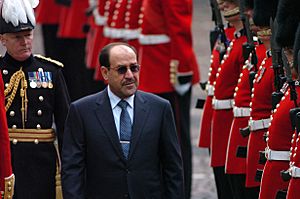
On 13 June 2006, U.S. President George W. Bush visited Baghdad. He met with al-Maliki and President of Iraq Jalal Talabani. This visit showed support for the new government. During this visit, they announced a plan for Iraqi students to study in the United States. This aimed to build connections between the two countries. On 25 June, al-Maliki presented a national reconciliation plan to the Iraqi parliament. This plan aimed to remove powerful groups from the streets. It also sought to open talks with those who opposed the government. Some saw this as a brave step towards rebuilding Iraq.
By July 2006, when al-Maliki visited the United States, challenges continued. Many felt the reconciliation plan was not working fast enough. On 26 July 2006, al-Maliki spoke to a joint meeting of the U.S. Congress. Some politicians did not attend the speech. This was after al-Maliki spoke about Israel's actions in Lebanon.
In September 2006, Al-Maliki made his first official visit to neighboring Iran. Iran's influence on Iraq is a concern for Washington, D.C. He discussed "no interference in internal affairs" with Iranian officials. This included President Mahmoud Ahmadinejad. His visit followed an incident where Iran held Iraqi soldiers. Iran claimed they had crossed the border illegally. Al-Maliki called Iran "a good friend and brother" during his visit. A press conference with al-Maliki and U.S. President George Bush on 14 December 2008 was interrupted. An Iraqi journalist, Muntadhar al-Zaidi, threw his shoes at Bush.
Later Roles
On 8 September 2014, when the new government led by Haider al-Abadi was approved, al-Maliki was named one of the three vice presidents. This is an important but mostly ceremonial position.
On 11 August 2015, the Parliament approved a reform plan. This plan included removing the three vice president posts. However, al-Maliki stated in September 2015 that he was still in office. He said that removing the post was not in line with the Iraqi Constitution. Another Vice President, Osama al-Nujaifi, also filed a complaint against the decision. On 10 October 2016, the three Vice President posts were restored. The Supreme Court of Iraq said their removal was unconstitutional.
Personal Life
Al-Maliki is married to Faleeha Khalil. They have four daughters and one son. His son, Ahmed, was in charge of Al-Maliki's security. Two of his sons-in-law also worked in his office.
On 26 April 2006, al-Maliki stopped using the name Jawad. He had used this name since moving to Syria in the early 1980s. However, the name "Abu Esraa" (father of Esraa, his eldest daughter) is still sometimes used. This is common in Arab culture, especially among close friends and followers.
See also
 In Spanish: Nuri al Maliki para niños
In Spanish: Nuri al Maliki para niños
- Al-Malik or Bani Malik
- Iraq
- Islamic Dawa Party


